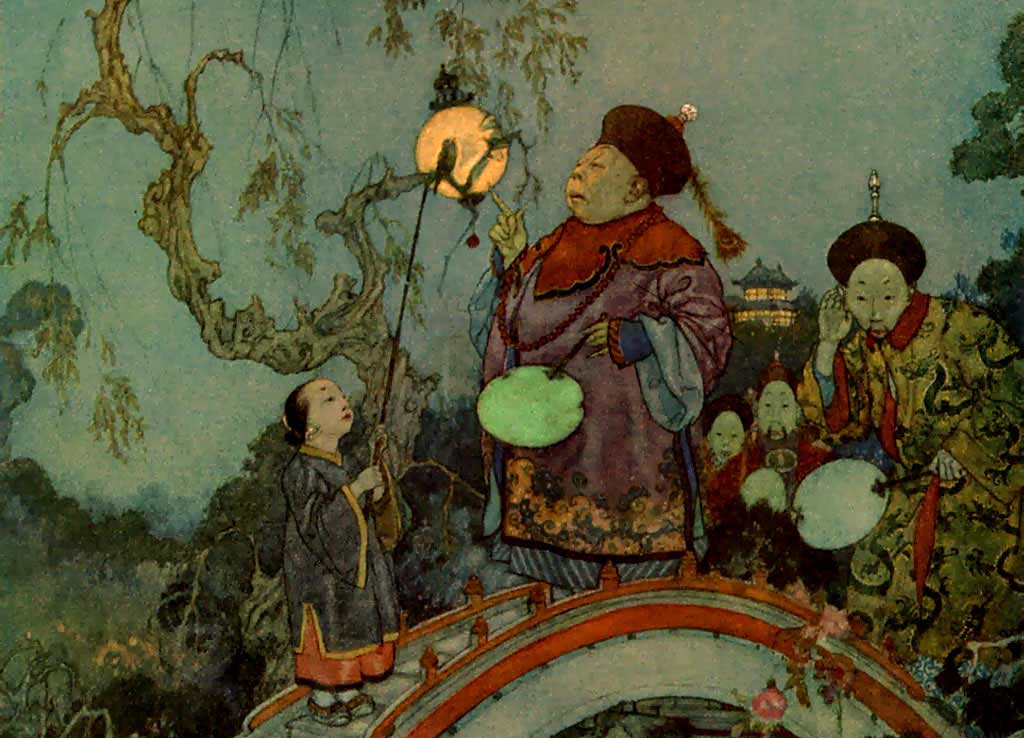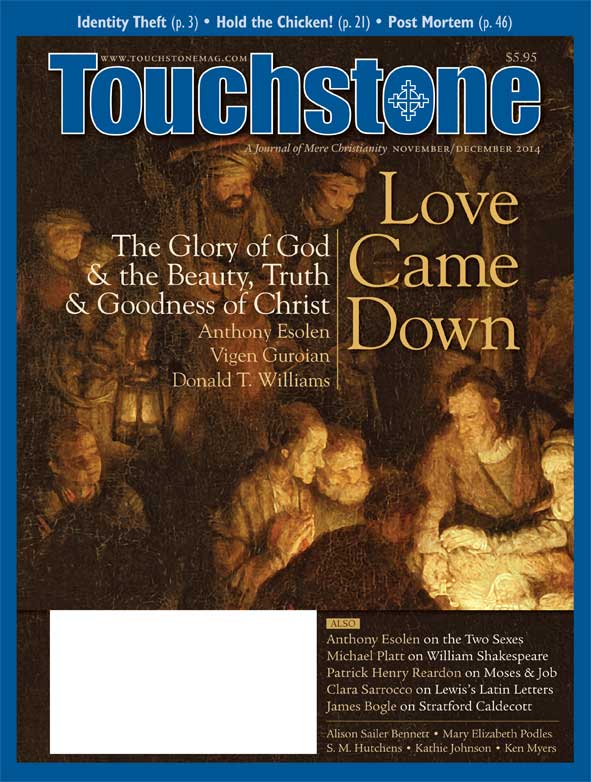Feature
The Light of the Nightingale
The Gospel Story Resonates Throughout
H. C. Andersen's Beloved Tale
by Vigen Guroian
For reasons that mostly have to do with the ways in which popular culture appropriates and recasts literature, "The Little Mermaid" and "The Ugly Duckling" are the best-known of Hans Christian Andersen's stories in America. Yet experts on fairy tales agree that "The Nightingale" is one of the very finest of his stories. Apropos to its musical theme and evidence to its artistic brilliance, "The Nightingale" has even inspired several ballet scores, the best known of them by Igor Stravinsky.
Even that notorious post-modernist czar of children's literary criticism, Jack Zipes, praises "The Nightingale" as "a remarkable treatise about art, genius, and the role of the artist." Zipes has staked his reputation on the theory that good fairy tales subvert the prevailing social norms of their day. When a story falls short in this regard, he usually criticizes it. Thus, in spite of his high estimate of its literary achievement, Zipes faults "The Nightingale" for conforming to "the essentialist ideology of the period" and for supporting old traditions "of class and patronage." "Ironically, to have a soul in Andersen's fairy tales," Zipes maintains, "one must sell one's soul either to the aristocracy or the bourgeois." And this, according to Zipes, is precisely what the Nightingale does when he returns to the Emperor's service at the end of the tale.
Zipes recognizes that Andersen was biblically literate and influenced by Christianity. Yet from his postmodernist perch, he judges that Andersen's frequent use of religious speech and symbolism masks the author's personal insecurities and his need to please the classes upon whom he depended for fame and fortune. This is a perverse hermeneutic. By the standards of Christian orthodoxy in the Denmark of his day, Anderson's religious beliefs were undeniably idiosyncratic. Yet insomuch as he included Christian themes and motifs in his story, why must we conclude that they were insincere?
I might not go quite so far as to say that "The Nightingale" is an allegory of Christ. However, I am prepared to argue that the religious and redemptive meaning of the tale was evident to Andersen's Christian and biblically literate nineteenth-century Danish reading public, and that this was most likely a big part of the story's appeal. I certainly do not think that this readership would have thought the Nightingale's compassionate rescue of the Emperor from the jaws of death was a servile obeisance to the powers that be—and neither should we.
In the following, I hope not just to uncover the Christian vision of this Andersen story but also to demonstrate how that vision helps make it a remarkable treatise on art and, in particular, the nature of beauty. We might begin by asking: What is beauty? Or to put the matter in a way more germane to our story: What gave reason for the fisherman to praise God for the Nightingale's song? Why does beauty evoke tears from those who hear it in a song or see it in a painting?
Beauty Is Transcendental
Emerson was moved to pronounce this about beauty: "Never lose an opportunity of seeing anything beautiful, for beauty is God's handwriting—a wayside sacrament. Welcome it in every fair face, in every fair sky, in every fair flower, and thank God, for it is a cup of blessing." Ancient Christian writers describe beauty as the splendor of the Good, the very radiance of the divine life, which is reflected in creatures that come from and rest in the hands of God. All of Creation participates in this transcendental beauty. Christ exhorts his followers to "be perfect just as your Father in heaven is perfect" (Matt. 5:48). The Gospels invite us to conform ourselves to that image, that form of beauty, that is revealed in the person of Christ, the express Image of the Father, "who made the worlds . . . [and] is the brightness of his [the Father's] glory" (Heb. 1:3). St Basil the Great reckons that, "from nature itself, we strive after the beautiful. All things, then, yearn for God."
I shall not enter into the much too often exercised argument over whether beauty is objective or subjective, absolute or relative. This is a false path. Beauty is in the eye or ear or nose of the beholder. But this alone does not account for beauty or explain how we come to recognize it. There is a light, not a corporeal light, but an intelligible or spiritual light, through which beauty reveals itself, in which beauty is; for God "dwells in unapproachable light" (1 Tim. 6:16). The experience of beauty is an illumination, an enlightenment. Much as time is an analogate of eternity, so corporeal light is an analogate of beauty. Beauty is light. Beauty is grace. Beauty is glory. The glory of God shines from and is reflected in the beauty, order, and harmony of his creation. "The heavens declare the glory of God and the firmament shows his handiwork" (Psalm 19:1). Or as Augustine exclaims: "How beautiful is everything, since you made it, but how ineffably more beautiful are you."
Whether beauty be in an object, such as a sculpture, or is communicated directly through the emotions in the rhythm of a poem without the intermediary of an object, beauty is a transcendental. It always surprises. Beauty is not just the product of desire or the quality of an emotion. No degree of conditioning or preparation avails it to us. Whether or not we desire beauty, beauty reaches us from a beyond, which persons of belief know to be God.
David Bentley Hart has stated,
Beauty possesses a phenomenal priority, an indefectible precedence over whatever response it evokes; it appears on the vastest of scales and the most minute, at once familiar and strange, near and remote; attempts to make it obedient to a particular semantics fail. . . . There is an overwhelming givenness in the beautiful, and it is discovered in astonishment . . . known only in the moment of response.
This moment is not just an ordinary moment, however. For while in time, this moment also transcends time. It is a kairos moment in which time is fulfilled.
Beauty Transcends Aesthetics
Peter, James, and John, all three fishermen, were bathed on the Mount in the incorporeal, uncreated divine light. And they were enabled to "see" the Son of God in the fullness of his glory. So it is fitting that in Andersen's story a simple fisherman is a recipient of such a revelation. The fisherman may forget the Nightingale soon after each experience of his beautiful song, much as the disciples seem to have forgotten what they witnessed on the Mount. Nonetheless, this beauty reaches his soul each time he hears it, and he thanks God for it, recognizing beauty as a divine gift. Because beauty has been revealed to him, when he hears the song of the mechanical bird, he immediately realizes that "something is missing," that its song is but a pale imitation of true beauty. Its song cannot do for the soul what the Nightingale's song can.
The Hebrew writers of Genesis selected the word tov to indicate God's delight in that which he created. Our English Bibles translate this word as "good": "God saw the light; it was good" (Gen. 1:4). "Then God saw everything that he made; and indeed, it was very good" (Gen 1: 31). However, tov is not the literal equivalent of agathon, the Greek word for "good." Thus, when the Hellenic Jews translated the Hebrew Scripture into Greek, known to us as the Septuagint—which was the Bible of the early Church—they translated tov with kalon, which means "beautiful." They recognized that tov connotes that which is fitting or appropriate, that which harmonizes and to which one responds with pleasure and approval. This choice of kalos rather than agathon represents the profound intuition that the goodness of God, his glory and his beauty, are one and the same in being. In other words, perfect goodness, beauty, and truth transcend the aesthetical categories and moral distinctions we turn to in a fallen and disharmonious world.
Our experience of good and evil as moral categories is a consequence of the Fall. The same can be said of our aesthetic perceptions of beauty and ugliness. In the kingdom of heaven there is neither evil nor ugliness. Even when art confronts us with ugliness, decay, discord, wickedness, and death, genuine art, the best art there is, does not abandon us to these but rather proffers possibilities for redemption and transfiguration. Jacques Maritain writes, "Art struggles to surmount the distinction between aesthetic beauty and transcendental beauty. And to absorb aesthetic beauty into transcendental beauty."
In other words, the dyad of the beautiful and the ugly that belongs to a fallen creation is not attributable to the divine life. In the realm of pure Spirit, it makes no sense to speak of ugliness. Every existent thing in its pristine form without complexity or ambiguity is good and beautiful within God's eternity. Those things that, according to an aesthetic measure, impress us as ugly, and those that, according to a moral measure, we judge evil share the same negative characteristics. They lack integrity and wholeness, they communicate or cause dissonance and discord, and they are dark, which is to say, they are opaque: they lack radiance and limpidity.
Beauty Is Light & Life
These qualities of radiance and limpidity are especially significant for an understanding of beauty. In the Gospel of John, Christ announces, "I am the light of the world" (8:12). The same Gospel also proclaims: "The light shines in the darkness, and the darkness did not comprehend it" (John 1:5). In other words, beauty is light and life. "In him was life, and the life was the light of men" (John 1:4). Beauty resurrects us into the light, into eternal life. "For it is God, who commanded light to shine out of darkness, who has shone in our hearts to give the light of the knowledge of the glory of God in the face of Jesus Christ" (2 Cor. 4:6). Christ is himself the uncreated beauty of God that has been revealed and been made visible for us in human form. "Jesus Christ, who, being in the form of God, did not consider it robbery to be equal with God, but made himself of no reputation, taking the form of a bondservant, and coming in the likeness of men" (Phil. 2:5–7).
The Spirit gives form to everything that exists. It hovered over the abyss and brought form out of the void and chaos. The Spirit came upon Mary and formed in her womb the man who is God. The Spirit descends upon each person at his baptism and reforms him into the image of Christ. The Spirit inspires the artist, the poet, and the musician to create. The artist does not make beauty; rather, beauty takes form in the painting, the poem, or the song. We can no more make beauty than we can make goodness or truth. Beauty does not issue from the hand of the artist but moves the artist's hand to paint or compose beautifully, or, rather, beauty is the milieu in which the artist paints and the musician composes. Beauty transcends that in which or through which it is manifested. And when we permit the Spirit to enter our lives, scales fall from our eyes and all of our senses are opened once again to beauty and immortal life as they were in the Garden.
On the Mount, the Spirit revealed Christ's own hidden beauty to his disciples when they were themselves bathed in the intelligible light of the divine glory, and for one kairos moment the scales of the ancestral sin fell from their eyes, and beauty overcame them. They were bathed in beauty; not Christ alone, but they also were transfigured by and in the Taboric light.
Yet they did not cry, for they experienced beauty in its fullness. Until such time, however, that our world and we are transfigured, the tears that we shed when we behold beauty are blessed by God. Blessed were the Emperor's tears, and equally blessed were the kitchen maid's. Our tears in this misshapen world are as beads of a prayer for beauty to reveal herself fully in all of her splendor. And with the seer of Revelation we exclaim: "Come, Lord Jesus!" (Rev. 22:20).
The nineteenth-century French symbolist and poet Charles Baudelaire wrote that it is the instinct for beauty
which makes us consider the world and its pageants as a glimpse of a correspondence with
Heaven. . . . It is at once by poetry and through poetry, by music and through music, that the soul divines what splendors shine behind the tomb; and when an exquisite poem brings tears to the eyes, such tears are not the sign of an excess of joy, but they are rather an irritated melancholy, an exigency of nerves, a nature exiled in the imperfect which would possess immediately, on this very earth, a paradise revealed.
Beauty Opens Hearts
The Nightingale said to the Emperor, "I shall never forget that the first time I sang to you, you gave me the tears from your eyes; those are jewels." From the beginning, the Nightingale discerned within the Emperor a spirit of piety, goodness, and truth that begged to be unlocked. It was the Emperor who was imprisoned in his own palace, who had to be freed. And so, ironically, he who had banished the Nightingale from his kingdom was moved to gratitude by that same beauty. Beauty has this effect upon us. It draws us out of our egocentrism; gratitude for beauty moves us to acts of kindness. We empathize with others, and pay our debt to beauty with acts of justice and mercy.
After the recovery from his illness, the Emperor says to the Nightingale, "You must come always. But I shall only ask you to sing when you want to." He not only proclaims the Nightingale's freedom, the Emperor declares also his own emancipation. Inspired by the Nightingale's song, he will begin a new life of service to his realm. "Now the Lord is the Spirit; and where the Spirit of the Lord is, there is liberty" (2 Cor. 3:17). "Let me come to visit you when I want to, and I shall sit on the branch outside your window and sing for you," says the Nightingale to the Emperor. "And my song shall make you healthy and thoughtful. I shall sing of the good and of the evil that happen around you, and yet are hidden from you. For a little song bird flies far. I visit the poor fishermen's cottages and the peasant's hut far from your palace and the court."
Elaine Scarry writes that beauty "is a compact between the beautiful being (person or thing) and the perceiver." This compact is essentially an act of freedom and love, the gift of one to the other without condition. Within this compact, within this milieu of freedom, beauty and love, fairness and justice, may be born. "Beauty seems to place requirements on us for attending to the aliveness" of others. The Emperor is brought back to life in this milieu of beauty; and the Nightingale knows that this new aliveness will open the Emperor's heart and train his thoughts on the wellbeing of his subjects, especially the poor and least attractive. He now will see his subjects in beauty. He will value their lives not because of their usefulness to him, but because, in living, they share in beauty and goodness.
In the tale, the Emperor wishes to break the mechanical bird into a thousand pieces. Still, the Nightingale tells the Emperor that this is not needful. "The mechanical bird sang as well as it could," the Nightingale explains. The Emperor has found offense in the mechanical bird, and this is understandable. If, however, his anger persists, there can be for him no catharsis or healing. Destroying the mechanical bird will not reach to the heart of the problem. For the source of the spiritual sickness that has afflicted the Emperor and his realm is not the beautiful mechanical object. Rather, the sickness is inside of human beings who have invested in this object an inordinate value. They have made it the vanity of vanities. They have put it in the place of its archetype, the living and life-giving Nightingale.
Beauty Beckons Us Toward the Beatific Vision
In the second Canto of the Purgatorio, Dante, Virgil, and the Roman philosopher Cato the Younger are standing at the foot of the mountain. There they encounter Dante's recently deceased musician friend Casella. After an exchange of greetings, Dante pleads,
"If no new law has stripped you of your art
or seized your memory of those songs of love
that used to still the yearnings of my heart,
. . . oh let it please you now awhile
to soothe my soul, which has, in coming here,
walked with my body many a weary mile."
Casella's song captivates the standing company as their minds are "touched by nothing else / But the notes of his song." Yet right before them is Mount Purgatory, beckoning them to the more encompassing beauty of the beatific vision. No romantic love song can substitute for this or, for that matter, the lovely psalmody of a newly arrived group of spirits. They are chanting Psalm 114, which recounts the story of the Exodus and the Israelites' journey to the Promised Land, which is apropos of the journey on which Dante has set forth. Meanwhile, Cato loses patience and exclaims:
"What's this, you sluggish souls! Get to the hill!
What lingering, what carelessness down here!
Hurry to scrape away the scales that keep
the Lord from being manifest to you!"
The mechanical Nightingale of Andersen's story reminds us of the jeopardy that comes with inordinate love and attachment to earthly objects, even the most beautiful of them. Their beauty is relative, and if properly approached, can point us toward beauty herself. But they must never replace beauty. Rather, they should inspire us, in C. S. Lewis's memorable turn of phrase, to move "further up and further in" to the milieu of beauty.
Sometimes, as in the Emperor's case, this lesson is learned through the agony of loss and loneliness, wherein our hearts are opened to the truth we have ignored or denied, as our spiritual eyes are opened to the beauty to which we have been blind or that we have banished from our lives. Moreover, lest our expectations be inflated, Andersen's story reminds us that sometimes truth and beauty are found in the most modest and unassuming of presences, small pearls of great value, such as the Nightingale.
Beauty's Ultimate Referent Is Christ
One of the great characters of Dostoevsky's fiction, Prince Myshkin of the novel The Idiot, is credited with having said, "Beauty will save the world." Routinely, commentators have interpreted this statement as if it invokes an aesthetic concept. But it is clear that Dostoevsky intends Christ as its ultimate referent. In Andersen's fairy tale, the Nightingale saves the Emperor. And like the Christ of the Gospels, he comes in humility, not in glory. "He had no beauty, no majesty to catch our eyes, no grace to attract us to him" (Is. 53:2).
The Gospel story resonates throughout Andersen's tale. Do not reveal "to anyone that you have a little bird that tells you everything, for then you will fare better," says the Nightingale to the Emperor. The Nightingale comes to the Emperor humbly, without demonstration or exercise of power. Yet the words that he speaks, nay, the songs that he sings, they bring beauty into the world, a beauty that heals and overcomes even death itself. •
Hans Christian Andersen's
"The Nightingale"A Short Retelling
A long, long time ago in China, an Emperor lived in a most beautiful palace. The palace was made of porcelain so that one had to be very careful when moving about lest something break. Far beyond the palace's formal gardens, which were of intricate design, lay a vast green forest; and at the utmost reaches of this forest, where land meets the deep blue sea, lived a nightingale that sang beautifully. The poor peasants and fishermen knew of the Nightingale and his song. Every time the fisherman heard the Nightingale's song, he exclaimed, "Blessed God, how beautifully it sings!" Consumed with his labor, the fisherman would forget the bird soon after hearing the song. But when he heard the Nightingale again, he would repeat, "Blessed God, how beautifully it sings."
Nevertheless, the Nightingale was not known to the Emperor and his court until, one day, the Emperor read of the Nightingale in a book that had been sent to him by the Emperor of Japan. Immediately he commanded his chief courtier to search for the Nightingale and bring him to his court that he might hear it sing. No one in the palace knew where to find the Nightingale except a lowly kitchen maid who had listened to the Nightingale's beautiful song on many occasions when visiting her sick mother. His song brought tears to the maid's eyes, for it reminded her of her mother's loving kiss.
The Nightingale captivated the entire court. On first listening, the Emperor himself was brought to tears, and the more tears ran down his cheeks, the more beautifully the little bird sang. The Nightingale's voice spoke to one's heart. His appearance, however, puzzled the chief courtier. How could such a beautiful song issue from such a diminutive gray bird? How was this possible? "I had not imagined it would look like that. It looks so common!" mused the courtier. He thought that perhaps the Nightingale had lost its color from shyness or out of embarrassment at seeing so many noble people.
The Emperor showered the Nightingale with gifts and arranged that the little bird have his own luxurious cage and that twelve servants attend to him at all times. The public received the Nightingale as a celebrity, though the bird found little pleasure or joy in any of this attention.
Then one day, a present arrived for the Emperor. It was a mechanical nightingale that was supposed to look like the real one, though it was made of silver and gold, and studded with sapphires, diamonds, and rubies. It could sing only one song, and had a cylinder inside its chest instead of a heart. It was thought that the live Nightingale and the mechanical bird should join in a duet. But this did not work. Whereas the mechanical bird kept perfect time, the living bird sang by its own inspiration. Over and over again the mechanical bird sang its song. In the meantime, without notice, the Nightingale flew out an open window and returned to its home in the distant green forest.
The Emperor banished the Nightingale from the kingdom for his ingratitude. Everyone, however, agreed that the mechanical bird's song was just as beautiful as the real nightingale's; and besides, the artificial bird was much pleasanter to look at, with its sapphires, rubies, and diamonds. The poor fisherman, however, was not convinced of the artificial bird's superiority. "It sounds beautiful and like the Nightingale's song," he murmured, "but something is missing, though I don't know what it is."
The imperial music master wrote twenty-five books about the mechanical nightingale. All of the Chinese people memorized its one song, which gave them special pleasure. But after a year of use, the artificial bird broke. The cylinders were worn, and it could not be fixed completely. So it was wound up to sing only once a year, but even then the mechanical bird could not quite complete its song.
Five years went by and the Emperor became gravely ill, so ill that the people began to mourn his death and prepare to receive a new Emperor. Death, with his empty skull, came to the Emperor in his bedroom. He wore the Emperor's golden crown, and held his saber in one hand and his imperial banner in the other. Shades, some ghastly and others kindly, haunted the Emperor. They were the evil and good deeds the emperor had done.
The Emperor sought the comfort of the mechanical bird's song, but there was no one to wind it up. Then, one day, the real Nightingale's song broke the dreadful silence. He had heard of the Emperor's illness, and come to bring him comfort and hope. His song caused the Emperor's blood to rush with renewed strength. And it moved Death himself so much that in exchange for the Nightingale's songs he returned the crown and saber and banner. Then the Nightingale sang about the quiet churchyard where white roses grew, and the fragrant elderberry trees, and where the grass was green from the tears of those who came to mourn. And Death departed, like a cold mist.
The Emperor thanked the Nightingale and remorsefully whispered, "You heavenly little bird, I banished you from my empire and yet you came to sing for me; and when you sang, the evil phantoms disappeared, and Death himself left my heart." How could he now repay the Nightingale? "You have rewarded me already," said the Nightingale. "I shall never forget the first time I sang for you; you gave me the tears from your eyes; and to a poet's heart, those are real jewels. But sleep, so you can become well and strong, and I will sing to you."
They agreed that henceforth the Nightingale would continue to live in his forest and come to sing for the Emperor, though not on command, but when he, the Nightingale, wished to do so. "My song shall make you happy and thoughtful," said the Nightingale to the Emperor. "I shall sing not only of those who are happy but also of those who suffer. I shall sing of the good and the evil that happen around you, and yet are hidden from you. I love your heart more than your crown. But do not tell anyone you have a little bird that tells you everything, for then you will fare even better." And when the servants entered the Emperor's room the next day, they stood agape, as the Emperor greeted them, "Good morning." •
Vigen Guroian was, until his retirement, Professor of Religious Studies in Orthodox Christianity at the University of Virginia in Charlottesville. His books include Tending the Heart of Virtue: How Classic Stories Awaken a Child's Moral Imagination (2002) and The Orthodox Reality: Culture, Theology, and Ethics in the Modern World (Baker Academic, 2018).
subscription options
Order
Print/Online Subscription

Get six issues (one year) of Touchstone PLUS full online access including pdf downloads for only $39.95. That's only $3.34 per month!
Order
Online Only
Subscription

Get a one-year full-access subscription to the Touchstone online archives for only $19.95. That's only $1.66 per month!
bulk subscriptions
Order Touchstone subscriptions in bulk and save $10 per sub! Each subscription includes 6 issues of Touchstone plus full online access to touchstonemag.com—including archives, videos, and pdf downloads of recent issues for only $29.95 each! Great for churches or study groups.
Transactions will be processed on a secure server.
more from the online archives
calling all readers
Please Donate
"There are magazines worth reading but few worth saving . . . Touchstone is just such a magazine."
—Alice von Hildebrand
"Here we do not concede one square millimeter of territory to falsehood, folly, contemporary sentimentality, or fashion. We speak the truth, and let God be our judge. . . . Touchstone is the one committedly Christian conservative journal."
—Anthony Esolen, Touchstone senior editor











